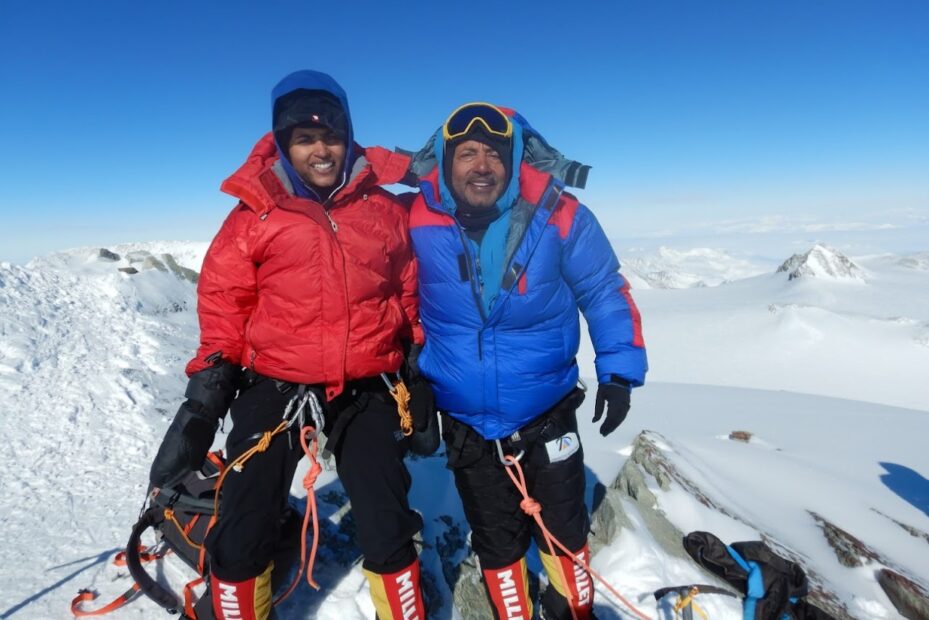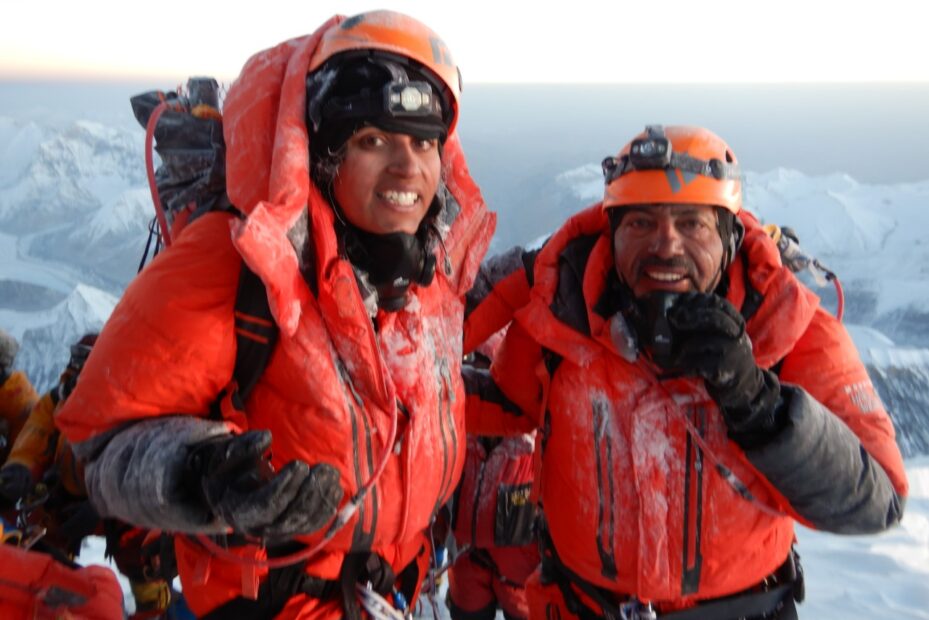The University of Pennsylvania’s founder, Benjamin Franklin, once declared, “Energy and persistence conquer all things.” This creed applies to many Wharton students; however, for MBA student and extreme adventurer Deeya Bajaj WG’23, energy and persistence are not just character traits, but tenets by which she charts the course of her life; lessons and challenges hard-fought, hard-won, hard-climbed. Raised in an adventurous family, Deeya spent her weekends and holidays as a child hiking, rafting, kayaking, cycling, and more. This proved to be invaluable preparation for the accomplishment of a lifetime: Deeya and her father recently completed their personal quest to ascend the Seven Summits of the world, which includes Mountains Everest, Elbrus, Kosciuszko, Kilimanjaro, Vinson, Denali, and Aconcagua. And with her trademark energy and persistence, Deeya managed to train for many of these expeditions while studying for her MBA at Wharton.
When Wharton Stories spoke with Deeya in her apartment in University City, she joined the conversation with a wide and relaxed smile, a lifetime’s worth of adventuring already amassed under her well-traveled belt.
Hello, Deeya! Please tell us a bit more about yourself. How did you get involved in the world of mountaineering?
I grew up in Delhi with my younger sister, my mother, and my father. For just about every family holiday, we went adventuring. Since my family owns an adventure tourism company in India, Snow Leopard Adventures, adventuring was always a part of our lives. We would go to the Himalayan foothills for rafting and hiking and zip-lining and other fun outdoor activities. This was normal for us; but, in India and for a family with two daughters and no sons, this certainly bucked the status quo. In most family systems within my home country, there is a stigma regarding girls participating in sports; and, unfortunately, daughters are not often given the same opportunities as the sons to participate in athletic activities.
But a foundational influence in my life is my father, who is a huge adventuring figure in India. Among other accomplishments, he is the first Indian man to ever ski both the North and South Poles, and he’s always worked to give my sister and me access to similar opportunities. As a little girl, I grew up listening to his accomplishments; and forever, I’d beg him to take me with me. My pleas fell on deaf ears; until, finally, at age 17, I asked to join my father on a cross-country skiing trip across Greenland, a proposition to which he agreed.
There, I achieved my own accolade, both for myself and my dad. Not only were we the first Indians to ever attempt and successfully ski across the ice-laden nation, but I was also the youngest person to do so as well: an incredible 550-kilometer journey that concluded after twenty-one freezing days, and my first taste of Big Adventure. Next, right after high school, my dad and I ascended Mount Elbrus; which is both the highest peak in Europe, and the first of the Seven Summits that we climbed as a father-daughter team.
I went to Cornell for undergrad and kept up with outdoor recreation. Cornell has a great program for teaching outdoor education, so I taught young people whitewater rafting and how to cross-country ski. One day, my dad visited; and as he reminisced on his adventures, he happened to bring up Everest. So, we decided we should try it.
After I finished my BS at Cornell, I moved home to work on the family business. Over those two years, in between helping our guests achieve their own dream adventures, my dad and I trained for Everest constantly, including with four practice expeditions. In 2018, we chose to ascend the face of Everest that is within China’s borders, the North side of the mountain, because the Chinese government more heavily regulates travel up the mountain. This makes for a more optimized travel experience because the authorities give out fewer permits; thus, less traffic and less trash. However, it is also steeper, colder, and windier.

When you were on the mountain, what was it like?
It was me, my father, and then a group of Indian climbers. Every climb I’ve done is both eerie and unique in different ways, but one aspect remains consistent throughout each and every one: it’s the people who make the experience. It’s less about the nationality of the other climbers as much as it is about the individuals. Putting yourself through extreme duress and calling it fun will attract like-minded people, and that makes the experience so special.
There’s something addictive about being outdoors and cut off from the rest of the world, going past your physical and mental limit. The friendships and community on these expeditions are so key because, in the most primal truth, you really only have each other. Anyone that I’ve climbed with, I trust with my life, and that’s why these bonds last a lifetime. I love adventure for how much it tests you; the community it builds; and being with a group of people who all chose to participate in an experience in the most raw of nature, working towards a goal together. And, of course, climbing with my dad is so special. We were India’s first father-daughter team to climb the North side of Everest. The reason this “first” is so important to me stems from how, back in India, daughters don’t always get these opportunities. Women and girls can do so much more with family support, and advocating for this essential truth is a major part of my life’s work thus far.

When did you finish the Seven Summits? What particular moments stand out the most to you from among that gamut of mountains?
Just this past May, my dad and I climbed Denali in North America. This was the last of the Summits and for that reason and more, just totally unforgettable.
The expedition to Mount Vinson in Antarctica stands as, by far, the most outlying location to which I’ve ever traveled. First, you fly to Chile, then to Union Glacier, then to basecamp, from where you ascend. It’s a really special expedition because of the continent is unabashedly isolated and extremely remote.
The most harrowing moment of all of these adventures probably comes from our Everest expedition: about an hour before we reached the summit, my dad’s oxygen mask froze over. The final stretch of the mountain leads you to a tiny and rocky path; too narrow for us to walk together, especially because we climbed with Sherpa guides. My dad encouraged both myself and my Sherpa guide to go ahead without him, so I moved proceeded with both reluctance and worry, concerned about my father’s health. And when you ascend Everest, you leave your basecamp at 8:30pm and climb overnight, so this scary scene occurred around 4:00am. Half-an-hour after this moment with the mask came to pass, I reached the summit, but the skies were dark and felt so much stress. Then, soon after, as the sun rose over the peaks, I looked down and saw my father among the climbers just below, safe and sound. What washed over me was an incredible feeling of both pride and relief.

Why did you choose Wharton?
Before Wharton, I worked for my family’s business, but I always wanted to scale up my impact. And at Snow Leopard Adventures, we are always trying to raise awareness and acceptance for girls in adventure; but I know that with a Wharton MBA, we can do so much more. I wanted to go to a school that will help me use the voice I’ve been fortunate enough to have to generate empowerment for women and girls everywhere.

What would you want to do with your Wharton MBA? What else are you involved in at Wharton?
In addition to advocating for equal representation of women in the adventuring field, I want to scale my family’s business. We currently run trips for both schools and corporate team-building training sessions. If I can increase the scope of the company as well as our audience, we can grow. At Wharton, getting the academic perspective on business operations is an enlightening experience; and I took William H. Alexander’s course, Strategies and Practices of Family-Controlled Companies, to deepen my knowledge on how to remain viable and grow even more successful in this context.
I am currently on the WGA Executive Board, which consists of four people (including myself) who plan and execute many activities for the whole school. It’s a lot to balance with classes, and I do overextend myself sometimes. But, personally, it works for me because I find I work more efficiently when I have too much to do. I prioritize my activities and make time where I have to; lessons that come from my outdoor experiences, like so many other principles by which I live my life.
— Devon Chodzin and Grace Meredith
Posted: January 12, 2023






















